There’s a scene in Kirsten Dunst’s new film, Civil War, when her character Lee, a seasoned photojournalist who has long since documented the horrors of combat, is taking a momentary respite from the chaos of her day.
Through gritted teeth, she reflects on the futility of her previous efforts to prevent America’s rapidly escalating second civil war. “Every time I survived a war zone, I thought I was sending a warning home: Don’t do this,” she says. There’s a despondency in her voice, but despite the dystopian reality she finds herself in, she seems more resigned than despairing. It’s as if to say: it is what it is, even if it’s the end of the world.
Become an S Insider
The latest in fashion, beauty, design, and arts & culture.
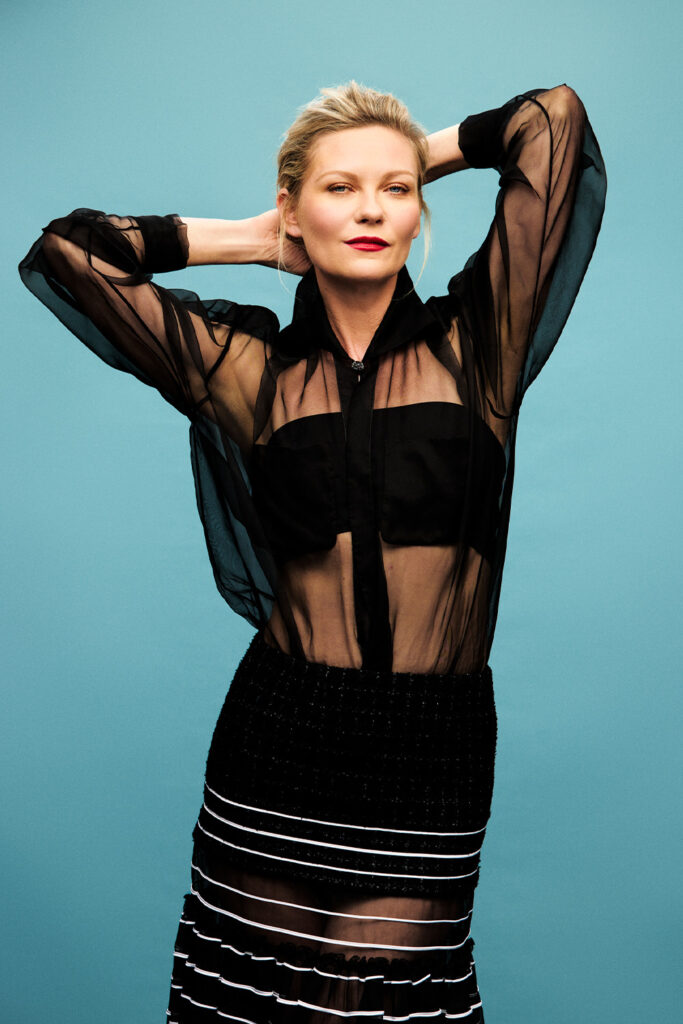
Full look by CHANEL.
Civil War (directed by Alex Garland of Ex Machina and Annihilation fame) is an all-too-real cautionary tale that follows a ragtag crew of journalists in the distant future as they travel across the United States during a war between a dictatorship government and separatist “Western Forces” led by Texas and California. Along their harrowing journey, the journalists encounter violent partisan militias, willfully ignorant 7 shopkeepers, and would-be insurrectionists who all feel like exaggerated stand-ins for the extremists that currently live inside social media comment sections. “I know that the people who have seen [the film] cannot stop thinking about it. It really shakes people to their core, but to me it wasn’t depressing because it is mostly about humanity and what happens when people stop communicating with each other,” says Dunst.
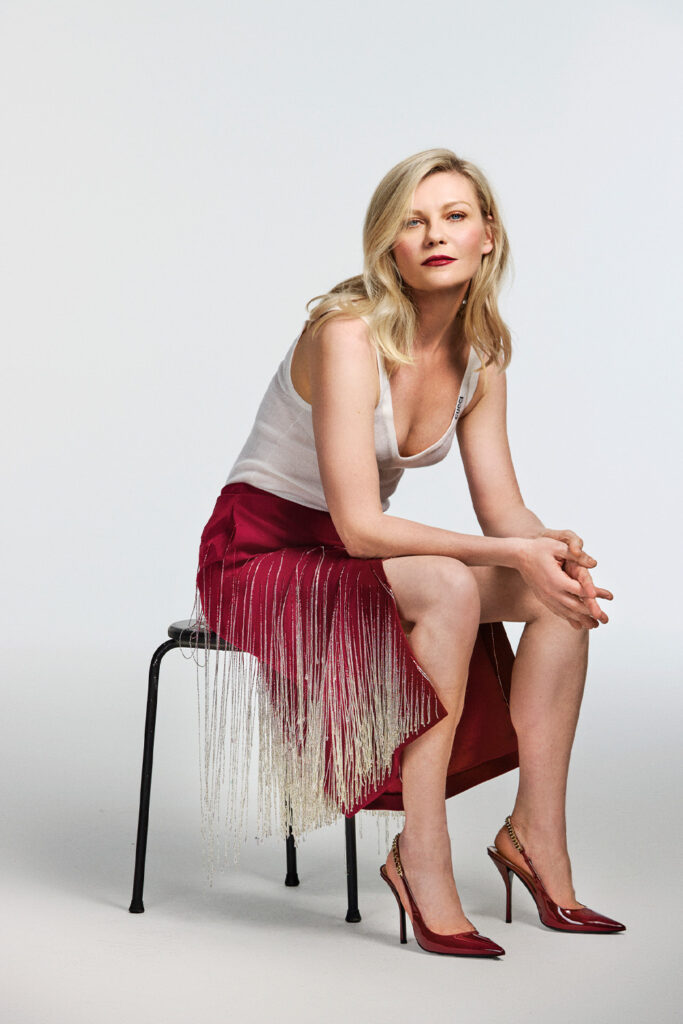
Full look by Gucci.
On screen, the 41-year-old actor has found a home in this kind of discomfort. As Lux Lisbon in The Virgin Suicides, her languid expression of teenage ennui was at the centre of Sofia Coppola’s landmark feature-length directorial debut. She played a bride in the throes of depression on her wedding night in Melancholia, a Lars von Trier film with a similarly eerie end-of-days storyline as Civil War (trade a planet threatening to collide with Earth for compatriots turning on one another). And in Jane Campion’s The Power of the Dog, she gave an Oscar-nominated turn as a ranch wife whose torment devolves into alcoholism. “It’s these directors, they keep hiring me to play these roles,” she tells me, with a smirk. Dunst is downplaying it, but her unique ability to illuminate the many degrees of female sadness has made her a natural icon for unsettling times.
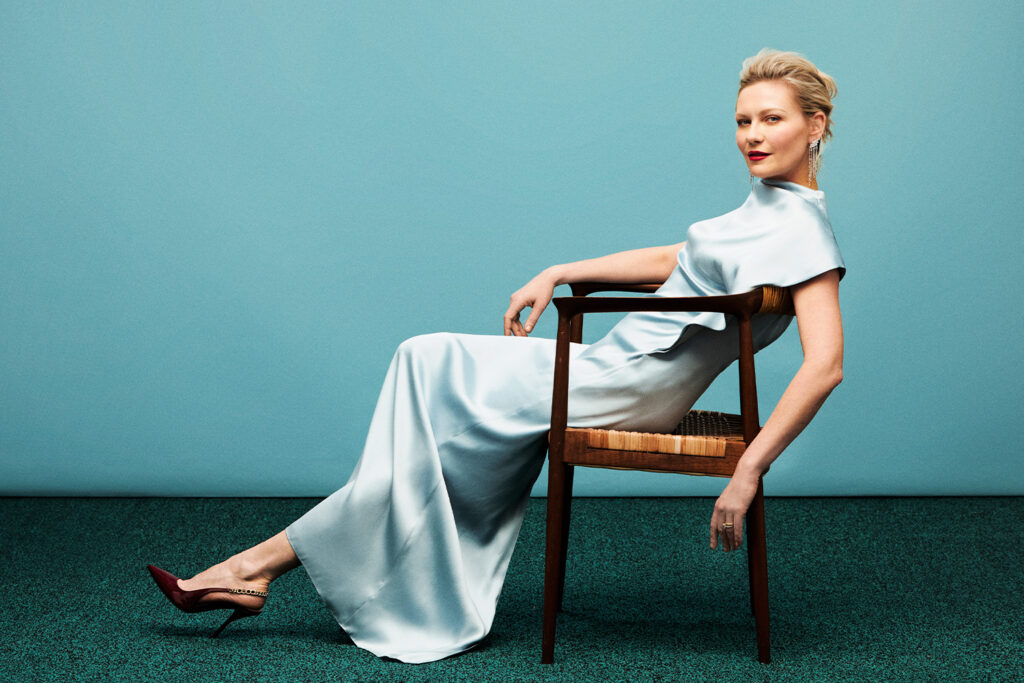
Dress by Fendi; shoes by Gucci; earrings and ring by Suzanne Kalan.
In one of Dunst and Coppola’s most notable collaborations, 2006’s Marie Antoinette, the actress repainted one of history’s most famously unrelatable figures into someone who was innocent, yet excessive, kind, yet tempestuous, triumphant, yet struggling—not good, nor bad, just a person at the centre of a revolution. When Dunst reflects back on the thread that connects all of her work, she speculates, “Maybe I’m drawn to these extreme feelings of ‘what are we all doing here?’”
Maybe Dunst was the original sad girl, but it wasn’t all depressing. Who could forget Dunst’s turn as Torrance, the charmingly perfectionist head cheerleader in the Y2K era classic, Bring It On, Mary Jane, who was one half of a now canon upside-down kiss in Spider-Man, or Amber Atkins, an ambitious accidental pageant winner in the camp masterpiece, Drop Dead Gorgeous? There are too many singular performances to list here, but suffice to say, Dunst holds a very special place in the hearts and minds of so many women who have continued to see their innermost isms laid out in front of them in her films. Likewise, I’ve felt kindred to Dunst since she played a young Amy March in 1994’s edition of Little Women, a film that meant so much to me I could scarcely discuss it with her without getting misty-eyed. “We grew up together,” she tells me. She’s being generous, of course, but from the sunny backyard of her Los Angeles home—flanked by monstera plants that she shows me still have her mother’s sloppily strung Christmas lights hanging from them—she comes across more like a friend than someone who helped define my womanhood. And even though our childhoods couldn’t have been more different, we share the same nineties nostalgia for times that were innocent, free, and lacked the self-awareness that kids on social media now inherently have. In the middle of our chat, Dunst breaks into a rendition of Ginuwine’s raunchy ’90s R&B anthem, “Pony,” which makes both of us giggle like back in the day.
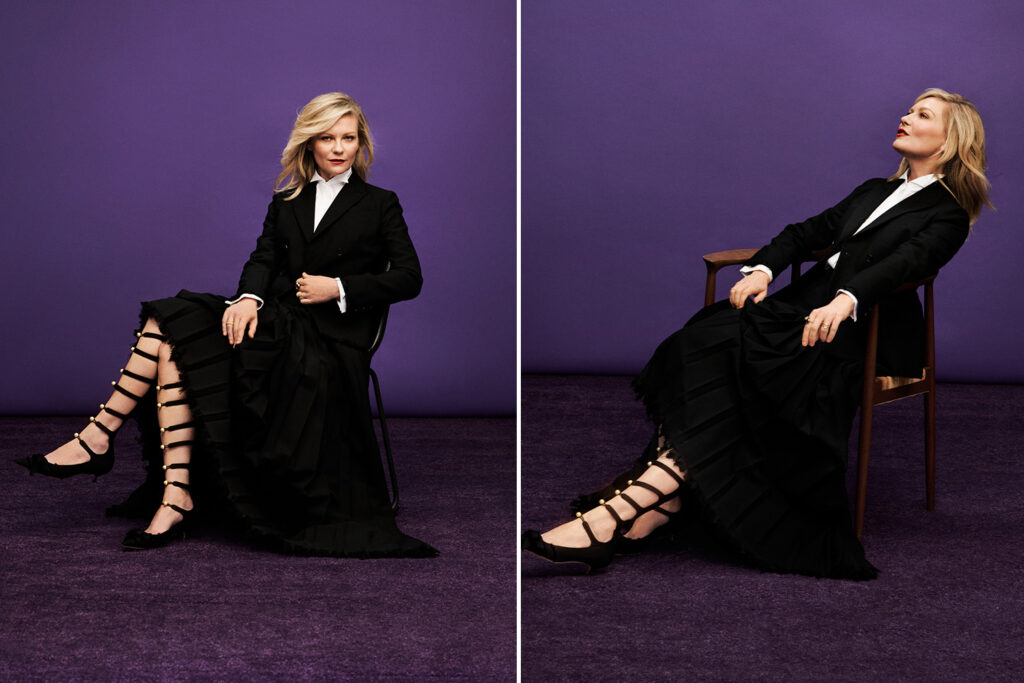
Full look by Dior; jewellery by Anita Ko.
“My world right now is Volvo soccer mom. I’m like, sweats, school runs, soccer—get in a little glam mode suddenly—and that’s it. I put makeup on for 10 you,” she says. “Volvo soccer mom” is a far cry from Dunst’s well-documented archive of red-carpet fashion moments, many of which were created in collaboration with her close friends, designers Laura and Kate Mulleavy of Rodarte. The trio shares a feminine, old-timey aesthetic that was perfectly encapsulated in a blue lace appliqué cocktail dress, which Dunst accessorized with a shawl made of baby’s breath, at the L.A. premiere of Woodshock, a 2017 horror the three made together. “I mean, they’re two of my best friends, so I’ve worn a lot of Rodarte,” she says. Civil War is Dunst’s first movie in three years, which is partly because she’s busy raising the two sons she shares with actor Jesse Plemons, whom she met on the set of Fargo in 2015. (Plemons plays a small but terrifyingly pivotal role in Civil War.) Last fall, Dunst posted a photo of her youngest, James, hiding under a Spider-Man umbrella with the caption, “Has no clue his mom was MJ.” Innocence is relative, it seems.
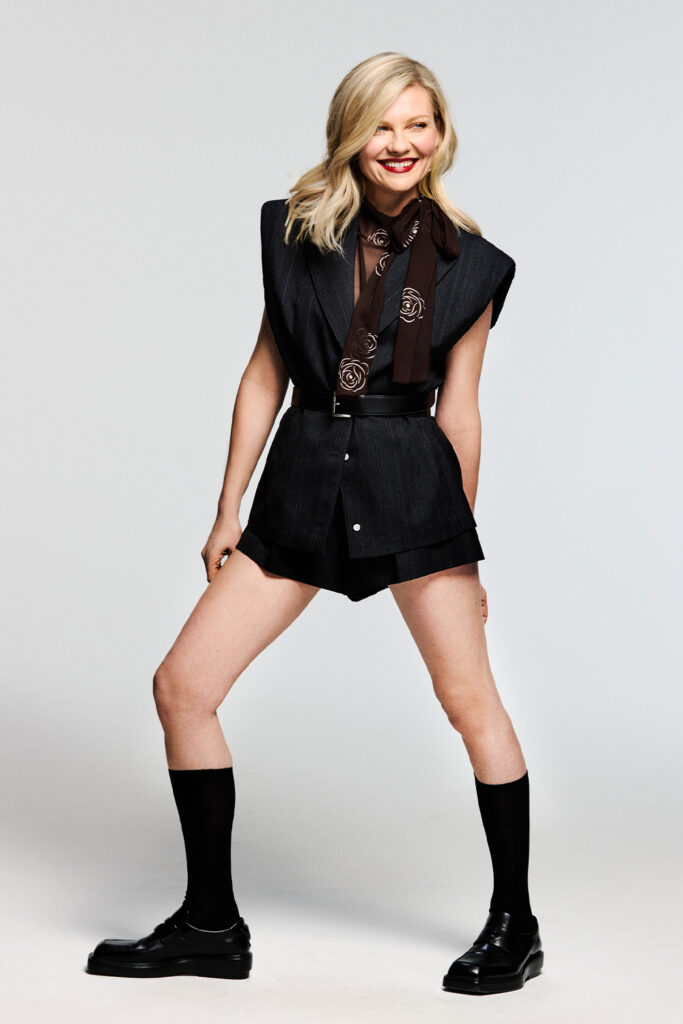
Full look by Prada.
“I am drawn to people who drum to their own tune, people that are pushing boundaries constantly or have a very unique perspective of how they want things to be.”
Kirsten Dunst
Dunst says she is also “annoyingly picky” about selecting projects to work on, prioritizing directors over the actual roles she plays. “I am drawn to people who drum to their own tune, people that are pushing boundaries constantly or have a very unique perspective of how they want things to be,” she says. “Just people who are willing to take big swings and have risks in their creative life.” Dunst is big on female directors, which has helped shape her knack for embodying such complex women and girls on screen. In a now-viral clip from a Hollywood Reporter roundtable alongside the likes of Jennifer Lopez, Kerry Washington, and Regina King back in 2016, Dunst suggested that it was the responsibility of her fellow actresses to seek out female directors and give them opportunities. “I stand by what I said,” she tells me. “It is up to you to make that happen, and to believe in someone.”
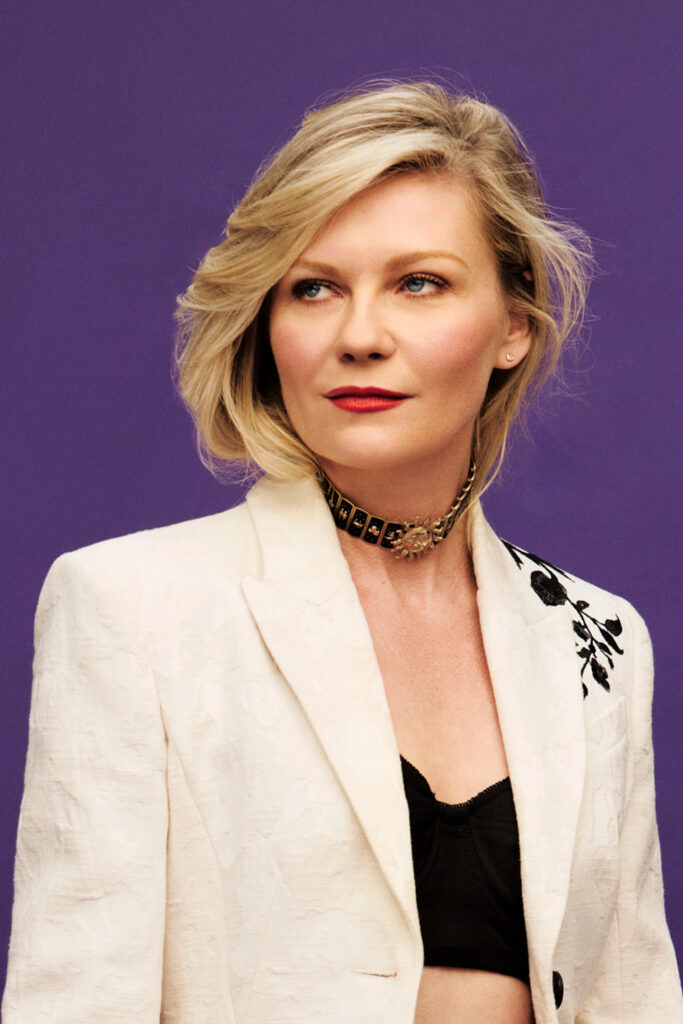
Jacket and bra by Erdem; necklace by Dior; earring by Anita Ko.
As for what comes next, Dunst is eager for something different, maybe a comedy, and definitely hopes to team up with her frequent collaborator, Coppola, on something new. “It’s gonna happen,” she says. “I don’t know when, but we want to do something together again.” As Dunst continues to move through the many phases of womanhood alongside her audience, the spectrum of our shared emotions is something we’ll continue to feel together. And she’ll make it into art.
Photography by Danielle Levitt
Styling by Samantha McMillen (The Wall Group)
Hair by Owen Gould (The Wall Group)
Makeup by Pati Dubroff (Forward Artists)
Digital Tech: James Armas
Photo Assistants: Sepehr Zamani, Kurt Lavastida
Production by Debra Orols, Kylie Schiff, Isaac Feria

